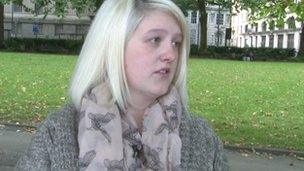Woman's abortion 'ordeal' considered by NI health officials
- Published

Senior health officials are considering the case of a woman who went from Northern Ireland to England for an abortion because her baby had no chance of survival.
Sarah Ewart had contacted the BBC's Nolan Show to highlight her experience.
Foetal abnormality is not a ground for abortion under Northern Ireland law.
"My only choice basically was to carry the baby either until it passed away inside me or I could deliver and it would pass away," she said.
"The law won't let you have an abortion unless the baby is going to harm you."
Sarah speaks to BBC Radio Ulster's Stephen Nolan about her abortion ordeal
Health Minister Edwin Poots said he had asked his officials to consider the case to ensure "everything has been done that we would expect to be done, within the confines of the legal position that exists in Northern Ireland".
Dr Fiona Bloomer, who lectures at the University of Ulster, and is researching the area of abortion law in Northern Ireland, said the legal conditions for abortion in NI were very unclear.
"The medical profession aren't clear how that legislation is actually applied," she said.
"The medical profession don't have any clear guidelines to enable them to actually enact that legislation.
"Unfortunately this case presented to the media today is not a first instance, evidence has been presented to the United Nations Committee on the elimination of discrimination against women which has a number of similar cases."
Justice Minister David Ford said: "I'm on record in the past as having said that there may be a small number of cases, perhaps a very small number of cases such as foetal abnormality, which need to be considered as to whether Northern Ireland law is currently adequate."
He said this would with regard to cases "where a foetus is not viable either in the womb or likely to be viable immediately after birth".
'Hard to come to terms with'
Sarah Ewart said she was 20 weeks pregnant when she went for a hospital scan last Thursday.
The scan did not detect any sign of her baby's head, so she was sent for further tests at the Ulster Hospital.
"We were told we were carrying a baby with anencephaly - it's the worst case of spina bifida so the baby has no skull formed and it's brain dead. It's very hard to come to terms with."
Sarah said she was told if she carried on with the pregnancy, the birth would be "very traumatic".
"It's not a case of having the baby and going home again - the baby has no skull to cause pressure for me to deliver and I wouldn't go in to labour either so they'd have to induce me," she said.
"I was told the only way I could have an abortion was if there was a threat to my life - after 12 weeks the baby has its own rights.
"If I was to carry on with the pregnancy in Northern Ireland, they scan you every two weeks until they find the baby has passed away then they bring you in to start labour."
She called for the law to be changed in Northern Ireland to allow abortions in cases such as this.
"We have a 12-week scan and a 20-week scan, and the hospital say you can't pick this sort of thing up until 14 or 15 weeks, so by the time you have your 20-week scan it's too late.
"Before this happened to me, I didn't agree with abortion but this is medical - this is a dead body I'm being forced to carry in Northern Ireland because of this silly law."
After she recorded her interview with the BBC's Stephen Nolan, Sarah travelled to England where she had an abortion.
Health Minister Edwin Poots said he had asked his officials to consider the case
In response to the story, Health Minister Edwin Poots said the law on abortion in Northern Ireland and any potential change was "a matter for the Department of Justice, the Executive and the Assembly".
"In DHSSPS my remit is to ensure there are quality services available, within that law," he said.
"There had been a particular focus on DHSSPS in relation to abortion as the department had been required for many years by the Court of Appeal to produce guidance for health professionals. I published draft guidance earlier this year and officials are currently considering the responses to the public consultation. However it is important to be clear that any DHSSPS guidance cannot change the law governing abortion, which would be beyond my department's responsibilities.
"Issues around the termination of pregnancy can present hugely difficult issues for families. I am only too aware of that from experience down the years as a local elected representative. It can be a challenging area for trust staff too. Anyone who thinks these issues are always simple has not given the issue the thought it demands.
"At all times those staff involved must be incredibly sensitive and compassionate. I expect the highest standards of care from our public servants, and if there are lessons to be learnt in how this or other cases have been handled I am keen to know about it and seek to rectify it. I do pay tribute though to the fantastic work our staff do day and night.
"Senior officials in my department are considering this particular case on my behalf.
"I want to be 100% assured that everything has been done that we would expect to be done, within the confines of the legal position that exists in Northern Ireland".
- Published9 October 2013
- Published8 March 2013
- Published27 February 2013
- Published27 February 2013
- Published19 February 2013
- Published4 February 2013